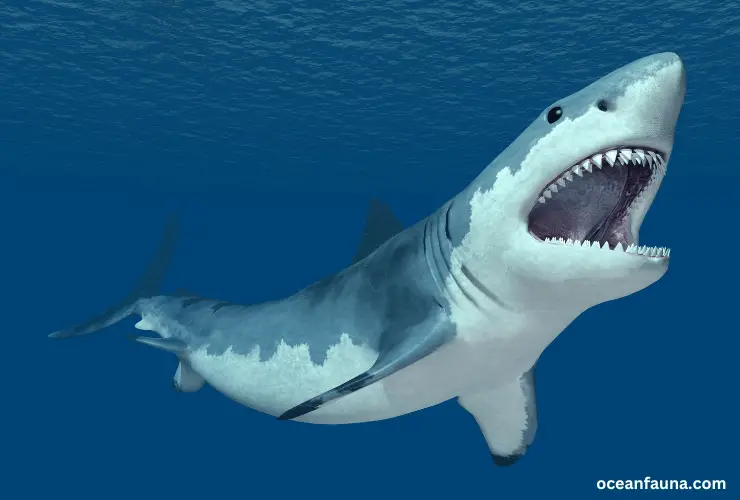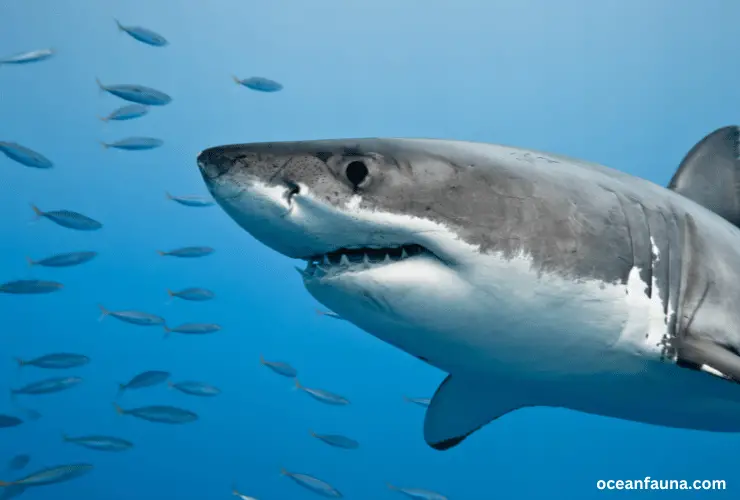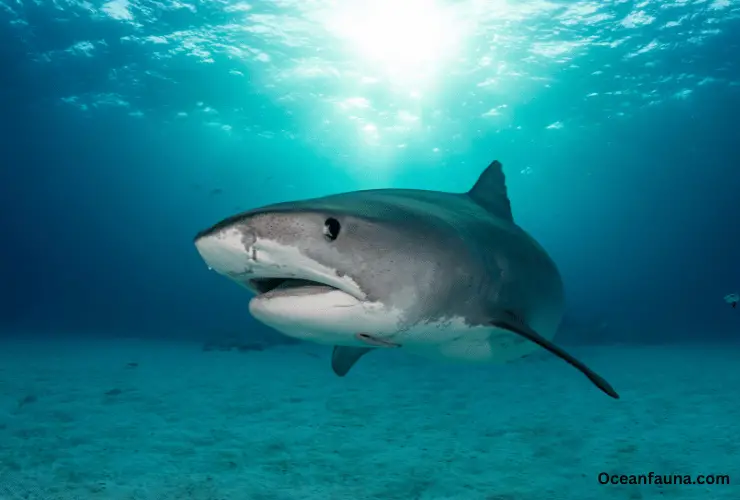Did you know that sharks are often considered the ocean’s top predators? Well, here’s an interesting twist: killer whales, which are actually a type of dolphin, are the ultimate predators that can effortlessly take down a shark. But what about other dolphin species? Do sharks eat dolphins?
Not all sharks eat dolphins, but some species do feed on them. Great whites, tiger sharks, and bull sharks are among the ones that go for it. In this article, I will discuss the types of dolphins that sharks typically consume and how they do it.
Are Dolphins Prey Items for Sharks?
Yes, dolphins can indeed be prey items for certain species of sharks. While not all sharks view dolphins as a potential meal, some of the larger and more predatory species, such as Great whites, tiger sharks, and bull sharks, have been known to feed on them.
Young and sick dolphins are particularly vulnerable to shark predation, as they have less mobility and are easier to catch. Sharks typically hunt in packs and can quickly take down their prey with powerful tail swipes or by tearing off chunks of flesh with their razor-sharp teeth.
Although fish typically make up the main food source for sharks, they are opportunistic predators and will also feed on other animals, such as seals and small whales. In some cases, dolphins may become unintentional victims when they get caught in the crossfire as sharks go after their larger prey.
How Do Sharks Eat Dolphins?

Sharks are apex predators that have been known to prey on dolphins, particularly small, young, or sick individuals. The hunting behavior of sharks is influenced by numerous factors, such as the species of shark, the availability of prey, and the environment in which they are hunting. In the case of dolphins, sharks have been observed to employ a variety of tactics to catch and consume their prey.
One tactic commonly used by sharks is ambushing their prey from below. Sharks prefer attacking dolphins from below as they can utilize the element of surprise to their advantage.
When a shark detects a dolphin, it will approach it quickly and with great force, often launching itself out of the water to capture the prey. This surprise attack may prove fatal to the dolphin, as it can sustain serious injuries from the impact of the attack.
Another tactic employed by sharks is stalking their prey. Sharks are known to follow dolphins for extended periods, waiting for the right moment to strike.
During this time, the shark will carefully observe the dolphin’s movements and behavior, attempting to identify any weaknesses that it can exploit. Once the shark identifies the perfect opportunity to attack, it will quickly grab the prey.
Sharks are also known to target sick or injured dolphins. Sick or injured dolphins are easier to catch and pose less of a danger to the shark. When a shark detects a sick or injured dolphin, it will quickly close in for the kill, taking advantage of the dolphin’s weakened state.
Which Dolphins Are Preyed Upon by Sharks?
Sharks are known predators of many dolphin species. Among these species are small or lesser-known, young, and sick dolphins.
Smaller dolphin species, such as the bottlenose, spinner, and common dolphin, are often preyed upon by sharks due to their small size and lower speed. These dolphins are frequently found in schools, making it easier for sharks to target them and increase their chances of a successful attack.
Young dolphins are also predators of sharks, particularly calves that are still nursing. These smaller dolphins are weaker and slower than adult dolphins, making them easy prey for sharks looking for an opportunity to feed.
Furthermore, sick dolphins are also easy targets as they are not as quick and agile as healthy dolphins, which makes it easier for sharks to catch them.
Sharks are formidable predators with highly developed senses, particularly their sense of smell, which allows them to detect even small amounts of blood in the water. They also have sharp teeth and powerful jaws, which help them to deliver lethal bites to their prey.
Are All Dolphins Vulnerable to Shark Predation?

Not all species of dolphins are vulnerable to shark predation. Orca or killer whales are safe from shark attacks. Even orcas are known to feed on sharks, and they exhibit a highly intelligent and cooperative hunting technique that allows them to take down even the largest and most dangerous shark species.
In addition, sharks are often afraid of adult dolphins and groups of dolphins. This is due to several factors, including the dolphin’s agility and speed in the water and their social structure and cooperation.
Dolphins are known to swim in groups, which can intimidate sharks and even deter them from attacking. It is also noted that adult dolphins have a lower risk of shark attack compared to younger or weaker dolphins.
When Sharks Prey Upon Dolphins?
Although dolphins are not common prey items for sharks, there are instances where sharks prey upon dolphins. These instances are rare and usually occur in situations where the dolphins are either young, injured, or caught in a stressful situation.
One of the main reasons sharks would hunt dolphins is due to opportunistic feeding behavior. When food is scarce, sharks can go after any food source they can find, including dolphins. Additionally, younger and more inexperienced sharks may also attack dolphins out of confusion, mistaking them for more common prey items.
Another factor that may lead to shark attacks on dolphins is competition for food. Both sharks and dolphins feed on similar prey items, such as smaller fish, and may often be found feeding in the same areas. This can lead to conflicts between the two species, with some sharks attacking dolphins to eliminate competition for food.
Despite this, sharks still mainly prefer other prey items, such as smaller fish and marine mammals, such as seals and sea lions. In fact, some species of dolphins, such as the bottlenose dolphin, have been known to actively avoid areas where sharks are present, indicating a clear avoidance of predation.
Nutritional Benefits of Consuming Dolphins For Sharks

Sharks require a high protein diet to sustain their energy levels. Dolphins, on the other hand, are known to have a high-fat content in their flesh, which can be beneficial for sharks that require energy-dense food sources. Additionally, dolphins are rich in omega-3 fatty acids, which are essential for maintaining a shark’s cardiovascular health.
A study published in the Journal of Experimental Marine Biology and Ecology found that the fatty acid composition of dolphins consists of both monounsaturated and polyunsaturated fatty acids, which are critical for the growth and development of sharks.
Moreover, dolphins are also known to contain high levels of Vitamin E, which acts as an antioxidant within the body. This is particularly important for sharks, as they require a robust immune system to combat various pathogens and diseases.
The consumption of dolphins by sharks can, therefore, boost their immune system, ensuring that they remain healthy and active.
Regarding the nutritional breakdown, research has shown that dolphins consist of approximately 25% protein and 16% fat content. These percentages indicate that dolphins are a highly nutritious food source for sharks, enabling them to build and repair muscle tissue while also maintaining a healthy energy level.
The high protein content is particularly important for sharks as it aids in the growth and repair of their muscles, while the high-fat content provides them with the necessary energy to hunt and swim.
Does a Shark Attack a Group of Dolphins?
No, it is highly unlikely for a shark to attack a group of dolphins. In fact, sharks tend to exhibit caution around large groups of dolphins. Dolphin pods have been observed to unprovoked kill sharks, further reducing the likelihood of a shark attack on a group of dolphins. As long as the dolphins remain with their pod, they are relatively safe from shark attacks.
Furthermore, it is commonly observed that most dolphins tend to avoid areas with dense shark populations. This is a natural defense mechanism for dolphins against potential shark attacks. However, orcas are an exception to this rule. Orcas have been observed to attack and kill great white sharks, indicating their ability to fend off these predators.
While dolphin pods are relatively safe from shark attacks, individual dolphins swimming alone are more vulnerable. This is because sharks are more likely to seek out isolated prey. Therefore, it is recommended for dolphins to stay in pods to minimize the risk of shark attacks.
How Do Dolphins Protect Themselves from Shark Attacks?

Dolphins follow various strategies to protect themselves from shark attacks. Those strategies are discussed below.
Pod Formation
One of the primary ways dolphins protect themselves from shark attacks is by forming pods. Pods refer to groups of dolphins that vary in size but generally range from a few to several hundred individuals.
Dolphins are more likely to stay in pods to deter potential shark attackers because sharks are generally more cautious of preying on larger and organized groups. This is because bigger pods create more noise and movement in the water, making it harder for sharks to approach them unnoticed.
Additionally, the presence of other dolphins means that sharks face multiple potential prey, making the attack riskier.
Echolocation
Dolphins have a sophisticated sensory system, which they use to detect the presence of sharks in their vicinity. This sensory system is known as echolocation, which emits sound waves that bounce off objects and return information about the environment to them.
Dolphins can use this mechanism to locate potential predators such as sharks and take evasive action. Echolocation allows dolphins to detect sharks even when out of sight, providing them ample time to avoid them.
Tail Slapping
Dolphins have been observed using their fluke, or tail fin, to deter potential shark attacks. By slapping the water’s surface with their tails, dolphins can create loud noises that startle nearby sharks and make them wary of attacking.
This is an effective defense mechanism against shark attacks as it creates a disturbance in the water that can obscure the location of the dolphins. This technique also sends a signal to other dolphins in the pod to alert them about the presence of sharks.
Speed and Agility
Dolphins are known for their incredible speed and agility, which they use to avoid predators, including sharks. Dolphins can swim at speeds of up to 60 kilometers per hour and have the ability to quickly change direction and evade prey.
They also have a keen ability to maneuver in and out of tight spaces, allowing them to avoid predators in confined or shallow waters.
Conclusion
By now, you should have acquired a comprehensive understanding of the feeding habits of sharks when it comes to dolphins. Additionally, I have explored the nutritional benefit of dolphin consumption for sharks and several strategies employed by dolphins to evade becoming prey for sharks.
Dolphins, being highly intelligent beings, utilize a combination of echolocation, tail slapping, speed, and agility to effectively outmaneuver potential predators. Their remarkable abilities enable them to successfully evade harm and ensure their survival in the vast oceanic realm.
If you have any further queries about the relationship between sharks and dolphins, you may read our other blogs.


1 thought on “Do Sharks Eat Dolphins? [Explained]”